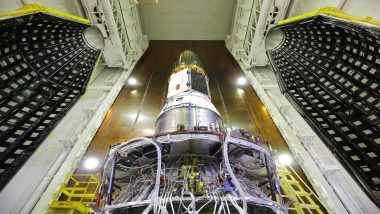Sriharikota (Andhra Pradesh) [India], July 30: The Indian Space Research Organisation (ISRO) has launched C56 (PSLV-C56) with six co-passenger satellites from Satish Dhawan Space Centre (SDSC) SHAR, Sriharikota on Sunday.
The launch took place at 6.30 am today.
This PSLV flight marks the 58th overall and the 17th using the Core Alone configuration. The upper stage of the rocket would be placed in lower orbit after injecting all the satellites to assure its shorter orbital life. PSLV-C56 Launch Update: Indian Rocket To Orbit 7 Singaporean Satellites, Including DS-SAR Satellite, on July 30, Announces ISRO.
ISRO Launches PSLV-C56
#WATCH | Indian Space Research Organisation (ISRO) launches its PSLV-C56 with six co-passenger satellites from Satish Dhawan Space Centre (SDSC) SHAR, Sriharikota.
(Source: ISRO) pic.twitter.com/2I1pNvKvBH
— ANI (@ANI) July 30, 2023
The PSLV-C56, according to ISRO was launched from the First Launch Pad (FLP) at the Satish Dhawan Space Centre (SDSC), Sriharikota.
PSLV-C56 / DS-SAR is the Dedicated Commercial Mission of NewSpace India Limited (NSIL) for ST Engineering, Singapore. DS-SAR, a Radar Imaging Earth Observation satellite is the primary satellite for the mission. In addition to this, there are six co-passenger customer satellites also belonging to Singapore. All satellites would be injected into a 535 km circular with 5 orbital inclination, stated a release from ISRO.
DS-SAR satellite is developed under a partnership between DSTA (representing the Government of Singapore) and ST Engineering. Once deployed and operational, it will be used to support the satellite imagery requirements of various agencies within the Government of Singapore. 'Congratulations India': Chandrayaan 3 Spacecraft Successfully Launched Into Orbit, ISRO Chief S Somnath Elated.
ST Engineering will use it for multi-modal and higher responsiveness imagery and geospatial services for their commercial customers. DS-SAR carries a Synthetic Aperture Radar (SAR) payload developed by Israel Aerospace Industries (IAI).
This allows the DS-SAR to provide for all-weather day and night coverage, and is capable of imaging at 1m resolution at full polarimetry, ISRO said.
(The above story is verified and authored by ANI staff, ANI is South Asia's leading multimedia news agency with over 100 bureaus in India, South Asia and across the globe. ANI brings the latest news on Politics and Current Affairs in India & around the World, Sports, Health, Fitness, Entertainment, & News. The views appearing in the above post do not reflect the opinions of LatestLY)













 Quickly
Quickly


